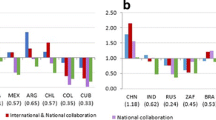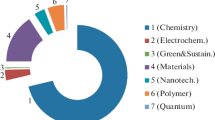Abstract
The efficiency of areas of science was evaluated using the DEA method. Areas achieving a maximum orientation or regard of international publication are rated as efficient. The areas of reproductive medicine, organic and inorganic chemistry in the former Federal Republic can thus be regarded as efficient areas of science. No area of scientific research in the former East Germany was able to achieve the optimum. The determinant in this connection is the adverse situation with respect to international orientation whilst no substantial difference in regard for further research could be detected between East and West German research.
Similar content being viewed by others
References
Team of Authors (1991a): Erster Technikreport: Industrietechnologie im Überblick; Lebensmitteltechnologie im einzelnen; mutmaßliche Wirkungen der Technik; denkbarer Bedarf an Technikfolgenstudien. Commissioned by Büro für Technikfolgen-Abschätzung des Deutschen Bundestages (TAB), FhG-ISI, Karlsruhe, 1991.
Team of Authors (1991b): Zweiter Technikreport: Naturwissenschaftliche Forschung im Überblick; Informationstechnologie im einzelnen; mutmaßliche Wirkungen der Technik; denkbare Folgen von Forschung und Technik. Commissioned by Büro für Technikfolgen-Abschätzung des Deutschen Bundestages (TAB), FhG-ISI, Karlsruhe, 1991b.
A. Charnes, W. W. Cooper, R. L. Clark, An Approach to Testing for Organizational Slack Via Banker's Game Theoretic DEA Formulations. Research Report CCS 613, Center of Cybernetic Studies, University of Texas at Austin, 1988.
A. Charnes, W. W. Cooper, E. Rhodes, Measuring the efficiency of decision making units,European Journal of Operational Research, 2 (1978), 429–444.
A. Charnes, W. W. Cooper, E. Rhodes, Measuring the efficiency of decision making units,European Journal of Operational Research, 2(4) (1979) 339 (Corrections).
A. Charnes, W. W. Cooper, E. Rhodes, Evaluating program and managerial efficiency: An application of data envelopment analysis to program follow through,Management Science, 27(6) (1981) 668–697.
P. S. Dasgupta, P. A. David, Resource allocation and the institutions of science. Marstrand Symposium on Economics of Technology, Marstrand, Sweden, 1991.
H. Grupp (1990a). Staatliche Politik und industrielle Strategien für Forschung und Technologie im Licht der Ertragsbemessung. In:Technikpolitik angesichts der Umweltkatastrophe,Krupp, H. (Hrsg.), Physica, Berlin, Heidelberg, 1990, pp. 192–209.
H. Grupp, (1990b), Zur ergänzenden Funktion von Wissenschafts- und Technikindikatoren am Beispiel der Telekommunikationforschung und- entwicklung in der Bundesrepublik Deutschland. In:Wissenschaftliche Zeitschrift der Humboldt-Universität, Berlin, Reihe Gesellschaftswissenschaften, 39 (1990) 835–855.
H. Grupp, Innovation Dynamics in OECD Countries: Towards a Correlated Network of R & D-Intensity, Trade, Patent and Technometric Indicators. In:Technology and Productivity. The Challenge for Economic Policy. Ed. Organisation of Economic Cooperation and Development (OECD), Paris, OECD 1991, pp. 275–295.
H. Grupp (Ed.),Dynamics of Science Based Innovation, Springer, Berlin, Heidelberg, 1992.
H. Grupp, Sh. Maital, A. Frenkel, K. Koschatzky (1993), The relation between technological excellence and export sales — A data envelopment model and comparison of Israel to EEC countries,Research Evaluation (In print).
H. Grupp, E. Albrecht, K. Koschatzky, By way of introduction: Alliances between science research and innovation research, in:Dynamics of Science-Based Innovation,Grupp(Ed.). Springer, Berlin, Heidelberg, 1992, pp. 3–17.
H. Grupp, U. Schmoch,Wissenschaftsbindung der Technik. Panorama der internationalen Entwicklung und sektorales Tableau für Westdeutschland, Physica, Berlin, Heidelberg, 1992.
S. Hinze, H. Grupp, Applied research and industrial development in East Germany: International comparison by performance indicators, in:Technovation, 12:4 (1992) 257–278.
K. Koschatzky, Forschung und Entwicklung für die Lebensmitteltechnologie von morgen, 1992 (in print).
H. Legler, H. Grupp, B. Gehrke, U. Schasse, Innovationspotential und Hochtechnologie. Technologische Position Deutschlands im internationalen Wettbewerb,Wirtschaftswissenschaftliche Beiträge, Bd. 70, Physica, Berlin, 1992.
W. Rammert,Entstehung und Entwicklung der Technik: Der Stand der Forschung zur Technikgenese in Deutschland, WZB, Berlin, 1991.
F. M. Scherer, The World productivity growth slump, in:Organizing Industrial Development,R. Wolff (Ed.), Walter de Gruyter, Berlin, New York, 1986, pp. 15–27.
U. Schmoch,Weubewerbsvorsprung durch Patentinformation, TÜV Rheinland, Köln, 1990.
U. Schmoch, H. Grupp, B. Schwitalla, W. Mannsbart,Technikprognosen mit Patentindikatoren, TÜV Rheinland, Köln, 1988.
A. Schubert, W. Glänzel, T. Braun, Scientometric datafiles. A comprehensive set of indicators on 2649 journals and 96 countries in all major science fields and subfields, in:Scientometrics, 16 (1989) 3–478.
R. Stankiewicz, Technology as an autonomous socio-cognitive system, in:Dynamics of Science-Based Innovation,Grupp H. (Ed.), Springer, Berlin, Heidelberg, 1992, pp. 19–44.
A. F. J. van Raan, (Ed.),Handbook of Quantitative Studies of Science and Technology, North Holland, Amsterdam, 1988.
P. Weingart, R. Sehringer, M. Winterhager, Die deutsche Grundlagenforschung im internationalen Vergleich. BMFT-Projekt, Arbeitsbericht zur Forschungsphase 1, Universitätsschwerpunkt Wissenschaftsforschung, Universität Bielefeld, 1987.
P. Weingart, M. Winterhager,Die Vermessung der Forschung, Campus Verlag, Frankfurt, New York, 1984.
Author information
Authors and Affiliations
Rights and permissions
About this article
Cite this article
Grupp, H., Hinze, S. International orientation, efficiency of and regard for research in East and West Germany: A bibliometric investigation of aspects of technology genesis in the United Germany. Scientometrics 29, 83–113 (1994). https://doi.org/10.1007/BF02018385
Received:
Issue Date:
DOI: https://doi.org/10.1007/BF02018385




